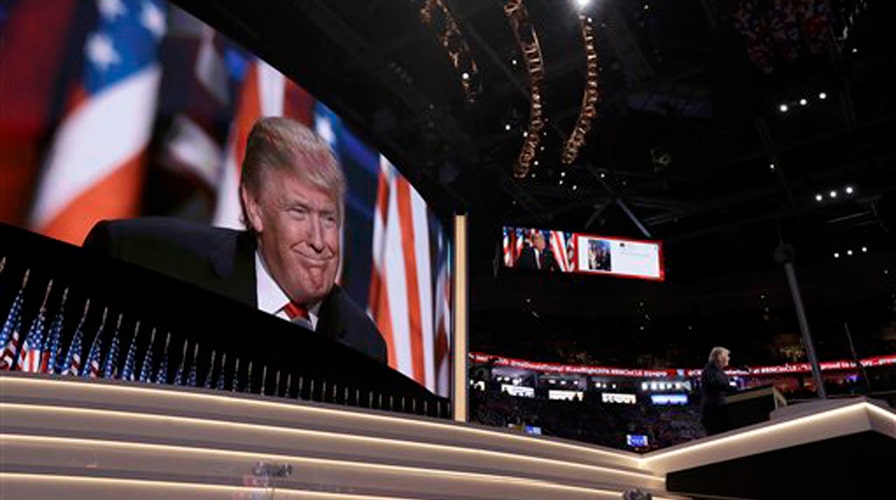Did the convention bring unity to the Republican Party?
Bloomberg politics reporter Kevin Cirilli weighs in
Contrary to what you might have heard from some quarters, the Republican Party did not lose its soul last week in Cleveland.
Yes, Donald Trump departs significantly from traditional GOP positions on free trade, immigration and entitlement reform, but his views better align the party with contemporary economic and political realities.
GOP stalwarts like the Chamber of Commerce may be aghast at Mr. Trump’s alleged protectionism but for decades the United States has borrowed and sold corporate assets and real estate to foreigners to finance huge trade deficits.
Foreigners now hold trillions in Treasury securities, and China could blackmail the next President in a showdown over its sovereignty claims in the South China Sea by threatening to dump its holdings on international capital markets and create a global financial panic.
All because Democratic and Republican administrations—including those of George W. Bush and Barack Obama—have stood by while foreign governments subsidize exports, erect higher tariffs and regulatory barriers to imports than the United States maintains, pirate American intellectual property, and manipulate currencies.
For ordinary working Americans, those do not foster fair competition but have spelled layoffs at factories, lower wages serving hamburgers or no job at all. Their pain is exacerbated by illegal immigrants who further drive down wages.
Mr. Trump’s proposals and personal history are hardly protectionist or xenophobic. A man who owns and runs hotels and other properties in the United States and abroad fully understands America can’t withdraw from global commerce or get along without legal immigration, but Washington must manage both processes better and more fairly.
That starts with renegotiating trade agreements to give American businesses and workers a fair chance at winning markets at home and abroad, and Mr. Trump’s harsh rhetoric notwithstanding, faithfully enforcing immigration laws.
All kinds of promises are made during campaigns, and I don’t expect Trump to really build a huge wall along our southern border or to be able to force Mexico to pay for it. However, I do expect him to effectively enforce the border and to not grant illegal immigrants legal status by executive order in the manner of President Obama.
Also, as a businessman, he is no friend of expansive government regulation—imposed by executive order or otherwise—that has so hampered economic growth.
He wants large tax cuts but prefers not to curb entitlements. Once elected, Speaker Ryan would educate him that he can’t get the former through the Congress without the latter. In the end, less expansive tax cuts and meaningful modifications to entitlements that reduce disincentives to work would likely be enacted.
Economic conservatives should be about enabling free and fair markets and empowering ordinary Americans to profit from those. Curbing foreign abuse of trade agreements, shutting down illegal immigration, ending executive branch overreach and lowering taxes would do exactly those things.
Those positions reflect the sentiments of the voter base of the Republican Party—largely less educated whites—who have been most harmed by poorly managed globalization and the barriers to jobs creation imposed by President Obama’s regulatory binge and penchant for taxation but who depend on government programs to shore up their diminished incomes and prospects.
Well-educated, prosperous Americans and minorities that economic conservatives, such as Jeb Bush and John Kasich, hoped to attract to the party during the primaries deserted the GOP in large numbers long before Trump’s ascendancy.
According to a Pew Research Center’s study of long-term trends in party preferences, Democrats hold a 52 to 40 percent edge over Republicans among college graduates, and a 56 to 26 percent edge among Hispanics, and even larger advantages among Asians and Blacks.
Among those groups, enough are ambivalent about trade that Hillary Clinton has moved towards Mr. Trump’s position, and many are skeptical that wholesale slashing of entitlements would reinvigorate growth.
Consequently, across all demographic groups, Democrats hold a 48 to 39 percent voter affiliation advantage, but Mr. Trump only trails Mrs. Clinton by 3 or 4 points in the polls.
His inflammatory rhetoric poses a substantial obstacle to winning over enough additional Democrats to prevail in November.
Win or lose, however, the Trump phenomenon should be a wakeup call to Republicans that the orthodoxy on free trade and many other issues are out of step with the times and can’t win them a majority of voters—in fact, it hasn’t in five of the last six presidential elections.

